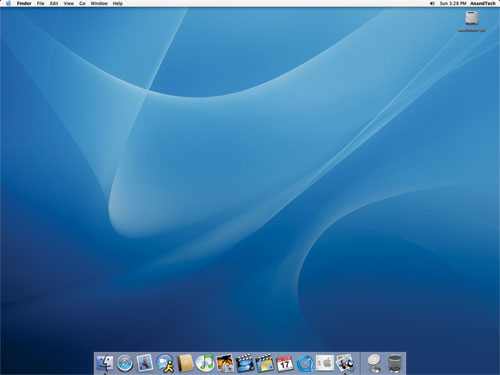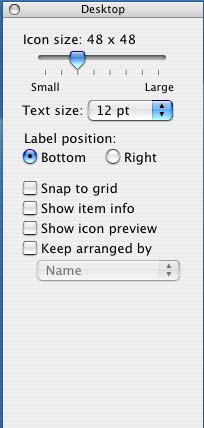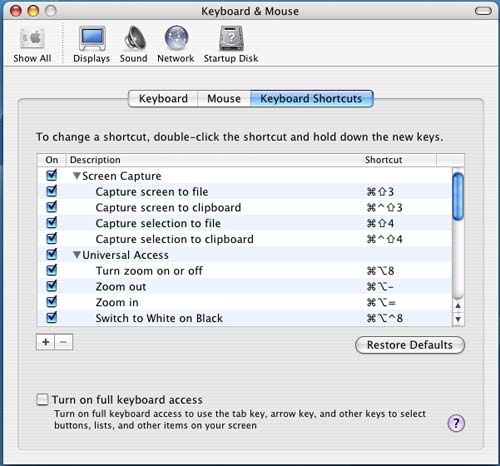A Month with a Mac: A Die-Hard PC User's Perspective
by Anand Lal Shimpi on October 8, 2004 12:05 AM EST- Posted in
- Mac
Finding my way around Finder
The OS X desktop is clearly different from what I was used to under XP. For starters, all of the icons have been moved to the right side of the screen; and where I was used to seeing a taskbar, there was this little translucent "dock" with a bunch of icons in it.
The OS X desktop and features, such as icon size, dock size and animations, are easily customizable.
Click to enlarge.
Under Windows, there is Explorer. It is the application that not only exists as a way of browsing your file system, but also as the "desktop" itself; the OS X equivalent? Finder. I don't think that I have to point out the similarity in the names. Yes, one company copied (or poked fun at) another.
My first reaction was that the icons on the desktop were far too large; indeed, they are, if you put them on a Windows desktop - but for some reason, they end up looking strange if you make them smaller. One of the biggest features of OS X is the ability to customize just about every aspect of the OS; I didn't like the size of the icons at first, so I simply changed the icon size through the "view options" menu. Although it's easy to talk about now, I had to ask how to do it online before I ever discovered the option - also the case with the majority of OS X, most of the power and customization of the OS remains hidden. I quickly realized that although Apple had targeted the entry level computer user with the interface of OS X, the OS was far more tailored to the power user in my opinion.

Where to start? Customization is much more possible (and easy to do) under OS X than any variant of Windows that I have ever encountered. Icon sizes are just the beginning; through the view options menu alone, you can change the positioning of the labels on the icons, the text size as well as the normal array of Windows options. And any changes you make here occur in real time - no clicking "OK" or "Apply". Just check a box and it happens instantaneously; and uncheck it, and everything goes back to normal. It's a small thing, but as I soon found out, much of OS X's appeal to me came in tiny gems like this.
The other thing to point out, which is quite possibly the biggest draw to OS X for me, is the fact that just about everything under OS X has a keyboard shortcut associated with it. I've found that if you got your start with PCs in the DOS days, then you end up being much more of a keyboard junkie than someone who is reliant on the mouse. I use the mouse when I have to, but when it's quicker to use the keyboard, I feel much more comfortable firing off a few keystroke combinations to get my point across. If you are anything like me in that respect, then OS X will be your playground.
I can't possibly list all of the keystroke combinations that I use on a daily basis, but there are quite a few. For example, I am a big "ALT-TAB"-er in Windows, but ALT-TAB is only really useful for switching applications, not closing them. The ALT-TAB equivalent under OS X, Command-TAB (the Command key is positioned where you'd expect ALT to be, so it works out fine), works similarly, but here's the catch - hit "Q" while you've selected an application and it will quit automatically. Nice, but nothing major right?
Want to minimize a window? Command-M will take care of that. Want to hide an application without minimizing it? Command-H. Hidden windows will automatically move to the end of the Command-TAB list, so you don't switch to them after you've hidden them.
Want to open a new Finder window? Command-N. Want to create a new folder on your drive? Shift-Command-N. I've always wanted to be able to create new folders in Explorer without using the mouse. OS X was a dream come true in that respect.
OS X will even let you define your own keyboard shortcuts for any application through the keyboard preferences panel:

Not impressed? Not a keyboard junkie? Then Finder is just as capable and as usable as Explorer. No big win for Apple there, but maybe a draw. For me, the little things are what intrigued me, but I'll admit - not everyone is as easily amused!
There is one aspect of the keyboard shortcut support that OS X does fall behind on, and that is support for keyboard shortcuts in dialog boxes. In some dialog boxes, hitting Command and the letter of the option you want to select will work, but in others, it will not. Furthermore, finding out the correct key to hit to select the option that you want is most definitely a guessing game, as there are no underlined characters or anything indicating what key to hit. Given OS X's strong support for keyboard shortcuts, this shortcoming (no pun intended) is puzzling.










215 Comments
View All Comments
raveng4 - Monday, October 11, 2004 - link
If you are having difficulty maintaining your Gf's mac you must be doing something wrong. You CAN use just about any non apple hardware for it. Most if not all wireless devices are Mac compatible. Most PCI Cards I've used are just plug and play on the Mac so I'm nost sure why you are having such problems.As for this article I find it prett well balanced.
victorpanlilio - Monday, October 11, 2004 - link
ss84 wrote in 139: So basically, the cheapest mac you can buy, that runs osx decently, costs 1300 dollars.No, as one commenter posted above, even the eMac would be suitable for "normal" computing tasks, and it starts at US$799. I just recently showed an eMac user (and his unit was an older 800MHz one, not the current 1.25GHz G4 model) how to turn his edited home videos into a DVD. At home I run OS X 10.3.5 on a G4 tower that's only 400MHz, with a 16MB ATI Rage128, and it's still fine for what I do (Photoshop retouching, a bit of video editing). I also have a 2.4GHz P4 Dell PowerEdge server for testing Win2K3 Enterprise. The Mac has no antivirus software; neither does the Dell -- but the Dell is fully patched, and I don't run IE on it except for Windows updates.
You also wrote: In an office environment, I cant think of anything that a mac can bring to the table that would offset the huge cost associated with each machine when compared to a windows machine that is suitable for the same task.
I respectfully beg to differ.
Re: "I can't think of anything" -- perhaps you might want to try thinking "outside the box" (literally). I derive part of my income from defending corporate Windows networks from malware. The billable hours required to do this are not at all trivial, given the increasing cooperation between spammers and virus writers -- blended threats are now the norm, not the exception. You can literally plug a modern Mac directly into the Internet (cable, DSL, whatever) and it will be fine. OTOH, I have plenty of experience with unprotected and misconfigured PCs in home and business settings, that were taken over by various kinds of nasty malware.
Even Bill Gates' own home PCs were hit (see ZDNet news story linked in an earlier post), so the Chief Software Architect of Microsoft has declared that MS will do something about it.
I recall a recent incident at a home building company, where I support the Macs in the marketing department. While the rest of the company was offline due to a worm that had gotten onto the corporate network from a laptop that carried the infection from home, the Mac users just kept working away, undisturbed by the support tech who was dashing madly from one PC to another to load a scan and remove tool -- and I had done exactly the same thing weeks earlier at another, all-Windows office. In short, we should not just look at hardware cost, look at the TCO (total cost of ownership). At C$95/hour for tech support, any price delta between Mac and PC hardware in an office-type environment can be quickly eroded by just one piece of malware running loose behind the defense perimeter. Since there are currently ZERO viruses for MacOS X, antivirus software and tech support to deal with malware intrusions are variable costs a business running on Macs does not have to deal with. Also, see my earlier post about the ratio of support techs to machines -- 1:208 for Macs, 1:70 for PCs, and this is based on my experience in large companies. Do the math. The costs for the "cheaper" PC quickly add up. I say this as someone who has worked in large PC companies (IBM, DEC, Compaq, Fujitsu) for much of his career.
ProviaFan - Monday, October 11, 2004 - link
I think the whole pre-emptive multitasking thing may be a case of confusing the definitions or concepts in an attempt to explain why both Windows 9x/ME and OS 9 and earlier all could be crashed very easily by improperly written applications, while Windows NT/2000/XP and OS X are much more resilent. While I am not so sure of the proper terminology myself, I _thought_ the problems came from lack of (or improper implementation of?) protected memory, rather than inability to multitask.fxparis - Monday, October 11, 2004 - link
victorpanlilio wrote in 135 (among interesting precisions) that our Macs are " inherently more secure than Window "I just " fear " that those leeches dedicated to hassle other people work and life have many skills and adaptation potentiality when it comes to "mal-programming"
I hope HE is right and I am wrong
emboss - Monday, October 11, 2004 - link
Err, oops, sorry 'bout that.Actually 9x does have pre-emtive multitasking, and it's dead easy to prove. Write a program like this:
int main(void)
{
while (1==1)
{
}
return 1;
}
Under a non-preemtive system, such as Windows 3 or earlier, this will hang the system. Running such a program under windows 9x will just result in a hung program (obviously) but the system will still be fine. On a Cray, of course, the application will finish running in under two seconds ;)
I have no idea why MS says 9x doesn't pre-emtively multitask, except possibly to try to convince people to upgrade to a NT-kerneled OS (which had pre-emtive multitasking from the beginning).
emboss - Monday, October 11, 2004 - link
ss284 - Monday, October 11, 2004 - link
So basically, the cheapest mac you can buy, that runs osx decently, costs 1300 dollars. What about the majority of people who dont have that much money to spend on a computer? Apple gives them no other option. I would not consider 1400 a decent price, especially in a corporate environment, where $800 workstations are more than enough for almost any sort of office work. In an office environment, I cant think of anything that a mac can bring to the table that would offset the huge cost associated with each machine when compared to a windows machine that is suitable for the same task.mxzrider - Monday, October 11, 2004 - link
i have both mac and pc (pc has windows and mandrake) i can live with out either. i use my mac (ppc g4) for video editing, but i am getting in premier, media 100 8 is getting really old. so i might sell my mac cuz it is dirt slow compared to my 800$ pc. i got hte g4 right before the g5 came out.(piss me off). but i can type faster the the apple can keep up. so i might go in to my 5 year old cusins room. or sell it for 1500 and get a new pc. i have floated farther and farther away from mac.Maybe becuase i dont do as much video editing much any more.victorpanlilio - Sunday, October 10, 2004 - link
GoodWatch wrote in #134: I’m just waiting for the first port of OS X to the Intel platform*sigh* Don't. Apple still makes most of its income from selling HW, not SW, and though it could be argued tongue in cheek that Macs are just expensive dongles for some really world-class apps, MacOS X is optimized for the PPC architecture -- even though its Darwin OS core is synced with an x86 version, OS X on x86 will likely not be sold to the public as long as Steve Jobs is CEO of Apple. Just imagine the developer revolt that would ensue.
bebopredux - Sunday, October 10, 2004 - link
Being a PC only ( well, OK, Debian Linux too ) user for the past 7 years I always heard the MacHeads claim a superior system. I admit to really wanting a Mac in addition to my PC.Luckily I won a Mac G5 with a 23" Cinema Display this past May! I was thrilled to say the least. I have been impressed. Why? Being a "computer guy" I am always getting nagged by friends and family to help with their PC woes. I have been overwhelmed lately with the endless spyware, adware and browser hijacks occuring with Windows machines. A lot of the help is for elderly people who have made the jump to computing. I admire them for this. However, it is an absolute jungle for these people. IE6 is a dog now infested with fleas and ticks. These people have given up surfing the web because of this. Firefox and Mozilla help but, compared with Macs, PC's are a a bitch to surf with lately if you don't have the know how.
I have taken to suggesting people buy Macs now for this reason alone. iLife is a very simple and easy to master suite that does all they need to do. Safari, IMO is a pleasant surprise.
Bottom line? Macs make it easier to work and play rather than be under the hood all the time scanning for spyware etc;.
This was a good article but, I found it to be nitpicking. Everyone, and I mean EVERYONE who comes over to my house and tries the Mac wants one now. I do web desing and graphics work on my PC. I am accustomed to it.
I think it's a smart thing to learn all the OS'es you can! I use Linux, OSX and XP on a daily basis. I am teaching my kids all 3 too ( as well as BeOS!! ). Truthfully, I wish Macs were less expensive. They are very nice machines and the OS is stellar and less prone to Windows assaults which, lately, is becoming a HUGE hassle akin to an epidemic.
The correct answer is that Windows and Macs are both great. However, Windows seems to be asleep lately with regards to security.